I love quotes. They have this ability to uplift us without having to read a whole chapter. I put together a few of my favourite ‘peace of mind’ quotes for you to enjoy. Feel free to pin them on Pinterest, or share this post on Facebook, Twitter or anywhere else.
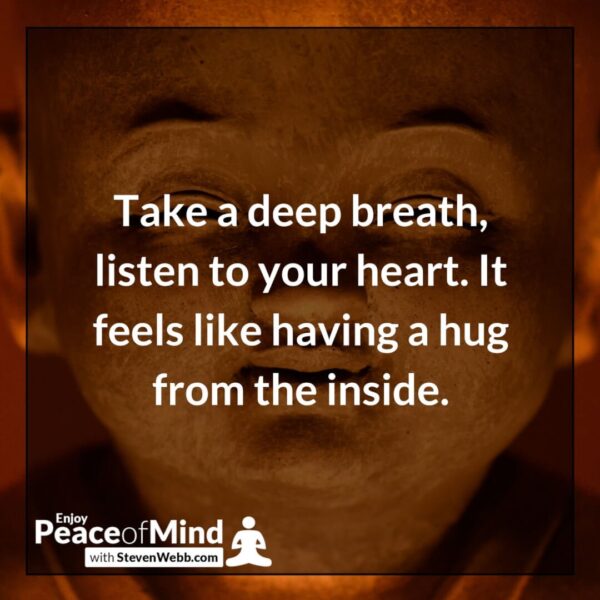
Take a deep breath, listen to your heart. It feels like having a hug from the inside. – Steven Webb
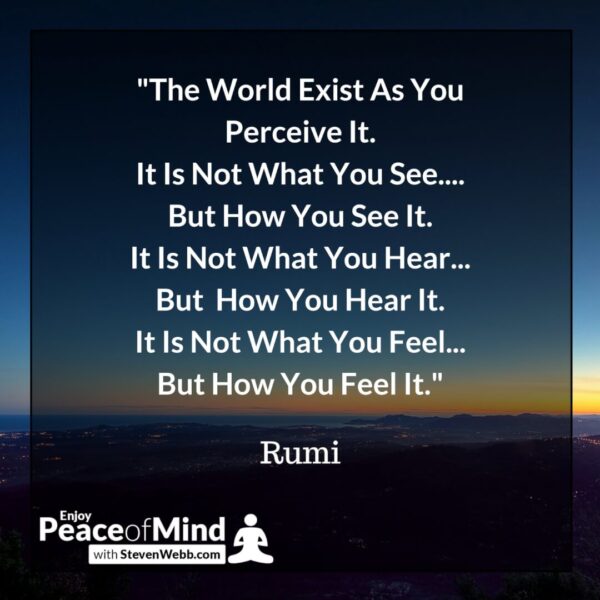
The World Exist As You Perceive It.
It Is Not What You See…. But How You See It.
It Is Not What You Hear…But How You Hear It.
It Is Not What You Feel…But How You Feel It.Rumi
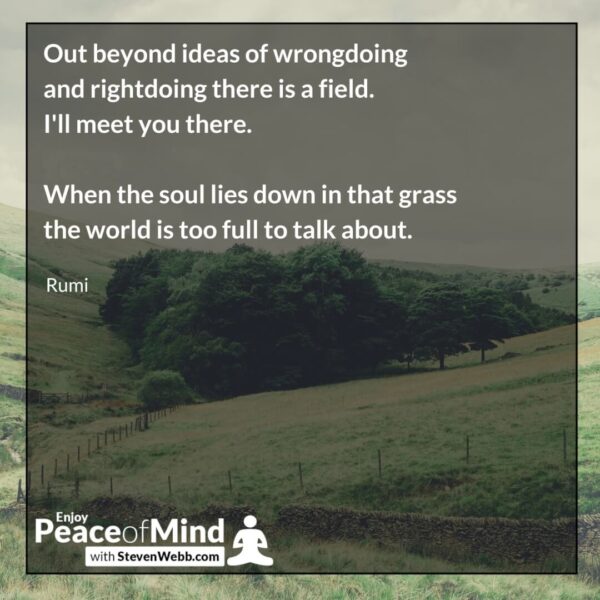
Out beyond ideas of wrongdoing and rightdoing there is a field. I’ll meet you there.
When the soul lies down in that grass the world is too full to talk about.
Rumi
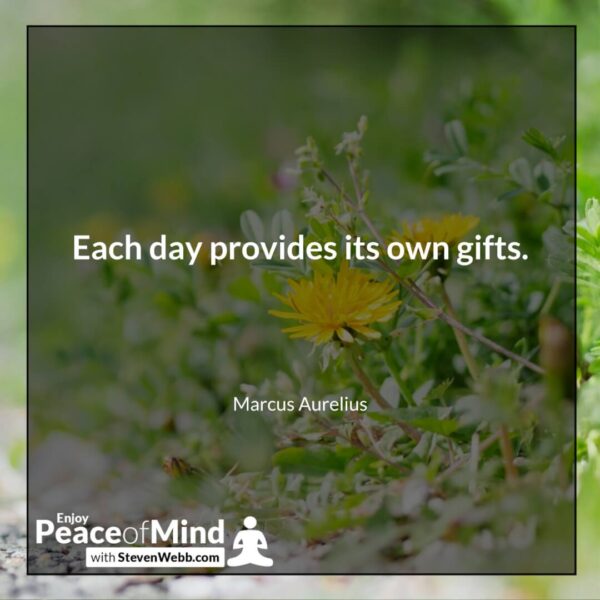
Each day provides its own gifts. – Marcus Aurelius
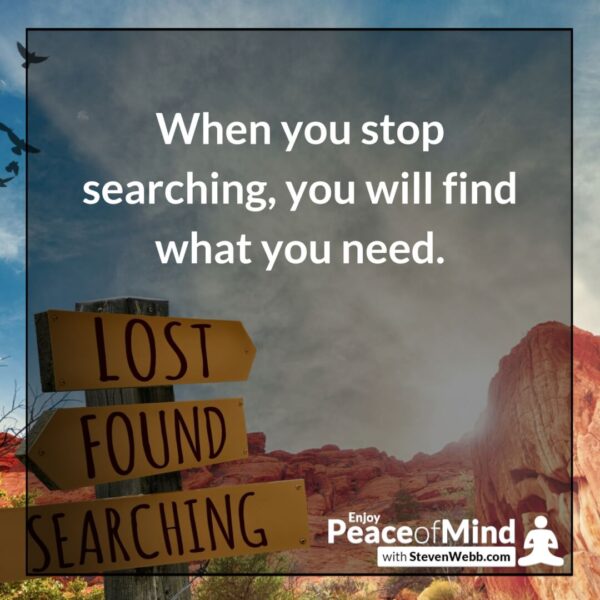
When you stop searching, you will find what you need. – Steven Webb
Extra Peace of Mind Quotes
Thich Nhat Hanh – “Peace is every step. It turns the endless path to joy.”
This implies that peace isn’t a destination but a process. Every moment, every step we take can be filled with peace, transforming our journey into one of joy.
Eckhart Tolle – “Realize deeply that the present moment is all you ever have. Make the Now the primary focus of your life.”
This stresses the importance of mindfulness, of living in the present moment rather than being preoccupied with the past or future.
D.T. Suzuki – “In the beginner’s mind there are many possibilities, but in the expert’s there are few.”
A beginner’s mind, or “Shoshin”, means maintaining an attitude of openness and eagerness when studying or approaching problems. This allows for greater creativity and flexibility.
Shunryu Suzuki – “When you do something, you should burn yourself up completely, like a good bonfire, leaving no trace of yourself.”
This refers to immersing oneself fully in the activity at hand, with complete sincerity and dedication, without attachment to self or ego.
Pema Chodron – “Inner peace begins the moment you choose not to allow another person or event to control your emotions.”
This encourages personal empowerment, stating that we have control over our emotional responses and thus our inner peace.
Alan Watts – “To have faith is to trust yourself to the water. When you swim you don’t grab hold of the water, because if you do you will sink and drown. Instead you relax, and float.”
This encourages trust and surrender in the process of life, instead of resisting or trying to control everything.
Dalai Lama – “Do not let the behavior of others destroy your inner peace.”
This reminds us to maintain our equanimity and inner peace, despite the actions or attitudes of others.
Matthieu Ricard – “Happiness is a state of inner fulfillment, not the gratification of inexhaustible desires for outward things.”
This emphasizes that genuine happiness comes from within, not from the external acquisition of objects or achievement of goals.
Jack Kornfield – “In the end, just three things matter: How well we have lived, How well we have loved, How well we have learned to let go.”
This quote stresses the importance of living fully, loving deeply, and the capacity to let go or forgive, as the key pillars of a meaningful life.
Ajahn Chah – “If you let go a little, you will have a little peace. If you let go a lot, you will have a lot of peace.”
This points to the direct relationship between our ability to let go of attachments, desires, or past hurts and our ability to experience peace.
S. N. Goenka – “Peace comes from within. Do not seek it without.”
This statement asserts that true peace is not found in external circumstances but within oneself.
Bodhidharma – “The mind is always present. You just don’t see it.”
This suggests that our mind, and therefore the root of our experiences, is always available to us. The challenge is to become aware of its workings.
Ryokan – “Who calls my poems poetry? My poems are not poetry. When you know that my poems are not poetry, then we can begin to discuss poetry.”
This quote embodies Zen’s paradoxical logic, hinting at the limitations of labels and encouraging us to go beyond conventional understanding.
Hakuin Ekaku – “From the beginning, truth is clear. Who can explain it?”
This encapsulates the ineffable nature of ultimate truth in Zen—it is clear and present, yet beyond intellectual explanation.
Ajahn Sumedho – “Peace is a simple step away; it’s just a matter of accepting things as they are.”
This encourages acceptance of reality as it is, which is the first step towards peace.


2 Responses
I too have been dealing with unbelievable odds. I more than admire you for becoming a coach. You’re a beautiful person for dedicating so much to everyone’s wellbeing.
Love Donna Marie
Thank you Donna, that’s really nice to read and for you to say so.
I would be interested in your unbelievable odds, please send me an email the link is at the top of the page.
Much love, Steven